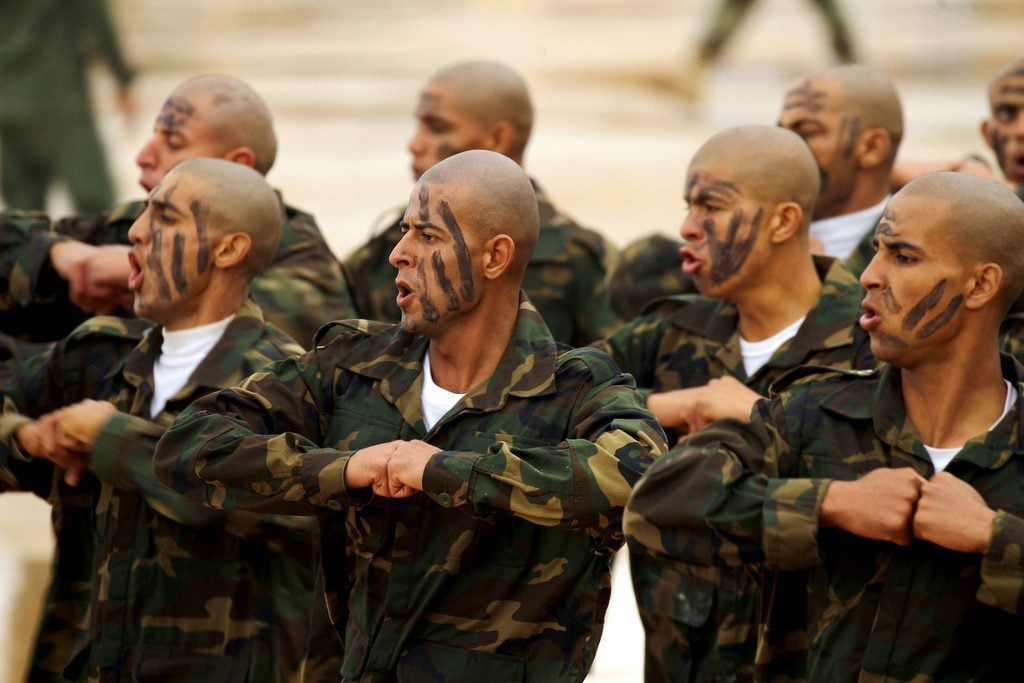
The balance of power has shifted in favour of General Khalifa Haftar and his self-described Libyan National Army, or LNA, since advancing on Libya’s south in January 2019.
The southwest, known as the Fezzan, is home to several tribes, militias and traffickers. Most are vying for influence in the politically and economically neglected region. Terrorist groups, such as Islamic State cells, are also believed to be exploiting the lawlessness.
While several countries have supported Haftar’s advancement, France is clearly the strongest backer of the Fezzan operation, as Paris has long viewed Haftar as a bulwark against terrorism.
The United Arab Emirates (UAE), Egypt, Saudi Arabia and Russia have also expressed their support for the operation despite the LNA’s history of committing war crimes in Benghazi and Derna.
This backing from several regional players has thus propelled Haftar to the forefront of any future political solution.
Even Italy, which has clashed with France’s position in Libya, hasn’t opposed Haftar’s manoeuvres. Rome instead appears to be pivoting towards Haftar to safeguard its oil and gas interests and prevent migration to Italy.
In the end, oil is Haftar’s most important bargaining chip. Since conquering the Fezzan, the LNA has seized the Sharara and al-Feel oilfields, which produce a total of 430,000 barrels a day or nearly half of Libya’s current oil output. The Tripoli-based National Oil Company, which is aligned with the UN-backed government that rivals Haftar, still manages the supply, but Haftar can shut down the entire economy by turning off the taps.
Since Haftar captured the south, US diplomats have also begun including the rogue general as a central figure in any plan to reunite the country. Libya security expert Fredric Wehrey writes that Washington has thrown its weight behind a United Nations effort to convert Haftar’s campaign into “momentum for a dialogue conference and national elections later this year.”
That plan depends on Haftar’s foreign backers, in particular the UAE, recognizing that the LNA won’t be able to conquer Tripoli without enduring major loses and triggering a complete state collapse.
“The Libyan National Army is more fissiparous than [Haftar’s] televised propaganda has suggested, his supply lines are stretched and he might face resistance from some militias in Tripoli and its environs,” notes Wehrey.
Abu Dhabi seems to have calculated that Haftar is better off negotiating a new power-sharing deal than waging an all-out war. In late February, the UAE invited Haftar and the internationally-recognized Prime Minister Fayez al-Sarraj for peace talks. But even this arrangement, short of a dictatorship, could be rejected by rival militias in Tripoli and Misrata.
One community that is battling Haftar’s troops is the Tebu, a dark-skinned African tribe rooted in the Libya’s south and the Sahel. One Tebu Libyan MP, Mohammad Adam Lino, resigned due to the violence and alleged that Haftar’s forces were discriminately targeting his people. He claimed that 90 houses were burnt down during an attack, including the homes of his brother and father.
Despite the crimes, Haftar has clearly negotiated with enough tribes and communities to maintain power in the south. Some merely submitted to Haftar out of desperation thanks to the impotence of the internationally-recognized Government of National Accord (GNA). Others supported Haftar’s forces to settle scores with their rivals.
Though not as divided, some western towns with armed militias have vocalized support for Haftar, although they are technically under the control of the GNA. This is the case in Sabratha, where the town’s strongest militia reportedly told Wehrey that they want the “army to restore order.”
“Multiple contradictions arise in this narrative. Haftar says he is building state institutions and fighting militias, but in practice he has relied heavily on local militias in his advance,” notes Wehrey.
Other cities remain starkly opposed to Haftar. Sirte, the town where slain dictator Muammar Qaddafi is from, is a case in point. After Haftar’s forces advanced towards the city, the Sirte Protection Forces (SPF) announced a state of emergency on March 10.
A source close to the LNA told reporters that the provocation was intended to test the prowess of the SPF. The SPF responded by dispatching units to patrol the south and west of Sirte. “The advance of Haftar’s forces is a security violation of the administrative borders of Sirte,” SPF’s commander Al-Naas Abdullah said.
Most concerning, of course, is that Haftar has continued to imply that he is preparing for an all-out assault on Tripoli. LNA spokesman Ahmed al-Mismari said just last month that elections could only take place once the entire country was “secure.”
“There should be no doubt that everything Haftar has done up until now has been to get to Tripoli, to be the man in Tripoli,” said Mohamed Eljarh, who is the co-founder of Libya Outlook for Research and Consulting, a think-tank based in the east. “He is likely to continue planning for a takeover “whether peacefully or violently.”
Despite backing elections to avoid bloodshed, Haftar has said that his patience is waning and that he has sleeper cells that he could activate in west Libya in a bid to seize the capital. In the eyes of many observers and former aids, Haftar clearly just wants absolute power.
“He wants to get to one of the big palaces in Tripoli and rule Libya–that is it,” said Mohamed Buisier, a U.S based engineer who was a close advisor to Haftar between 2014-2016 before falling out with him.



